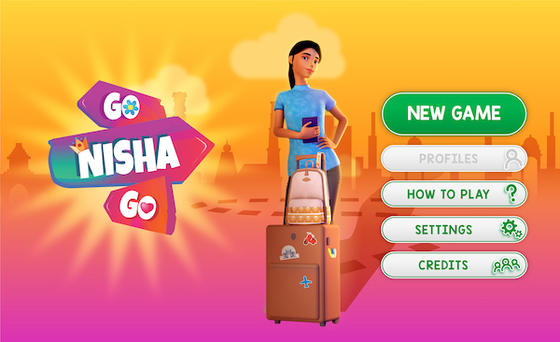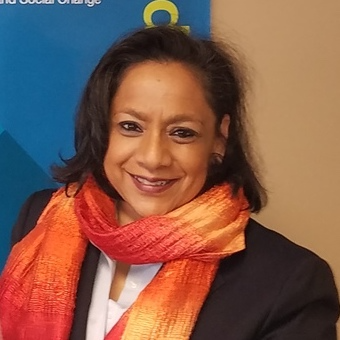When Susan Howard’s mother wanted to leave India for the United States in the 1950s, she had some negotiating to do.
“My grandparents were against it,” Howard said of her mom’s request, “but agreed on the condition that my mom be married. So, she compromised and said, ‘how about I get engaged?’”
That real-life scenario inspired the George Mason University professor to create Go Nisha Go, an award-winning game that helps girls and young women in India navigate and negotiate life choices.

“We're not trying to tell girls what is right or wrong. For some girls, listening to their parents is right for them,” said Howard, who teaches in the School of Integrative Studies. “Our aim with Nisha is to show players that their decisions matter and not to relinquish decisions to the father or their husbands or society even.”
The game, which was launched in June 2022, addresses public health concerns such as nonconsensual sex, reproductive health, relationships, contraception, and the detrimental stigmas that are attached to them, said Howard.
Go Nisha Go, which has more than 250,000 players in India, is a virtual experience that provides players with essential resources in the real world they can access directly from the game. It has 25 in-game partners from social entrepreneurs to private-sector companies and small businesses.

These partners provide menstrual hygiene products, as well as legal and crisis helplines for women who are being bullied or abused.
“The technology of embedding these links was challenging, but it was really worth it because we felt that it was our responsibility to bridge the in-game experience with real life.”
Howard, who received a PhD in environmental science and policy from Mason in 2020, cited an example of an important app embedded in the game.
“There's a scene where Nisha is talking to her mentor about when she's most at risk for pregnancy and how does she know. The mentor shows her an app that’s called Cycle Beads where you can track your period. In real life, players can download this app to their phones.”
The game was originally only available in three states in India—Rajasthan, Bihar, and Delhi—because that’s where young girls are most at risk for early marriage and pregnancy, Howard said, but it is now available in all 11 Hindi speaking states in India through Google Play.
Go Nisha Go is an interdisciplinary effort, Howard said. College of Science PhD student Chih Hao “Andy” Huang handles the in-game analysis and data security management, Schar School PhD student Patrick Baxter helped design the game’s large-scale randomized control study that is being done among 1,900 girls, and Mason alumna Jeannette Cachan is the knowledge management and monitoring advisor on the project. Mason Board of Visitor member Dolly Oberoi, CEO of C2 Technologies Inc., has been a mentor and guide to Howard since the inception of the idea.
As a game data engineer, Huang ensures the game's structure and the data used are safe and updated.
“One of the features that we used in the game was creating different models and using predictive analytics. During the game, the players will make different decisions and select different answers for questions or situations,” said Huang.
“We use that data, run through different algorithms, and then we get results for personalized messages so players can have a more personalized experience instead of a ‘one game fits all’ kind of experience."
Go Nisha Go was awarded Best Learning Game in 2023 by Games for Change and made the list of 10 Fast Company Innovation by Design honorees in social justice interventions.
“All design begins with people and understanding people,” said Howard. “At the end of the game, you get to see the outcome of all the choices you have made for your character, and how in real life you can be inspired to be your ‘best self.’”
Howard credits the liberal arts and the humanities for her approach of putting people at the center of technological innovations. She is currently working on two additional games: one in Nepal and a game for boys in India.
Related News
- October 9, 2025
- August 13, 2025
- June 2, 2025
- May 20, 2025
- April 16, 2025
This content appears in the Spring 2024 print edition of the Mason Spirit Magazine with the title "Helping Young Women Navigate Life Choices."
